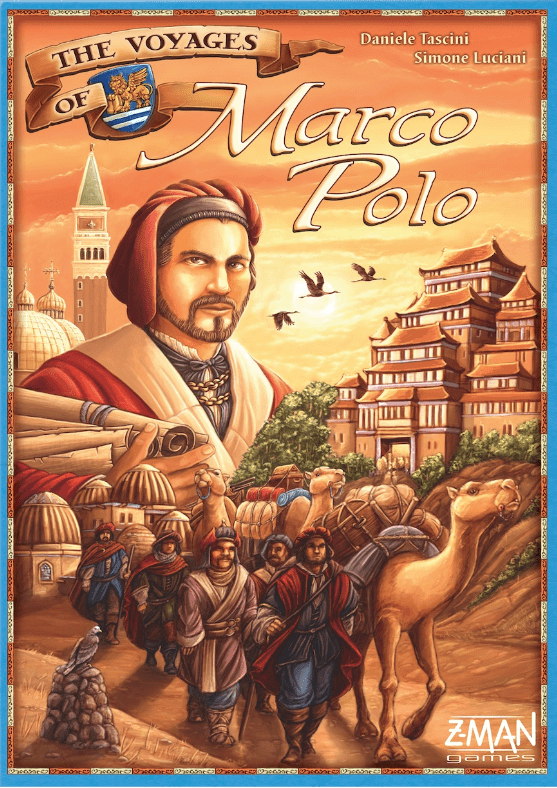
Auf den Spuren von Marco Polo (2015)
2 - 4 persone
40 - 100 min
12+
Nomi alternativi: Auf den Spuren von Marco Polo, In de voetsporen van Marco Polo, Marco Polo, Marco Polo Kereskedő: Világutazó játék, Sulle Tracce di Marco Polo, Viagens de Marco Polo, Los Viajes de Marco Polo, Les voyages de Marco Polo, The Voyages of Marco Polo, Τα Ταξίδια του Marco Polo, Путешествия Марко Поло, マルコポーロの旅路, 馬可波羅, 馬可波羅, 馬可波羅 Voyages of Marco Polo, 마르코 폴로
Editori: Hans im Glu00fcck, 999 Games, Albi, Albi Polska, Arclight Games, CrowD Games, Devir, Filosofia u00c9ditions, Giochi Uniti, Kaissa Chess & Games, Korea Boardgames, Piatnik, Swan Panasia Co., Ltd., Z-Man Games
Riconoscimenti: 2015 Cardboard Republic Tactician Laurel Nominee, 2015 Deutscher Spiele Preis Best Family/Adult Game Winner, 2015 Golden Geek Best Strategy Board Game Nominee, 2015 Golden Geek Board Game of the Year Nominee, 2015 International Gamers Award - General Strategy: Multi-player Nominee, 2015 International Gamers Award - General Strategy: Multi-player Winner, 2015 Jocul Anului u00een Romu00e2nia Advanced Finalist, 2015 Jocul Anului u00een Romu00e2nia Advanced Winner, 2015 Kennerspiel des Jahres Recommended, 2015 Meeples' Choice Nominee, 2015 Meeples' Choice Winner, 2016 Goblin Magnifico Nominee, 2016 Gra Roku Advanced Game of the Year Nominee, 2016 Gra Roku Advanced Game of the Year Winner, 2016 Hra roku Recommended, 2016 Jogo do Ano Nominee, 2016 Juego del Au00f1o Recommended, 2016 JUG Adult Game of the Year Finalist, 2016 MinD-Spielepreis Complex Game Nominee, 2016 Nederlandse Spellenprijs Best Expert Game Nominee, 2016 Nederlandse Spellenprijs Best Expert Game Winner, 2016 Scelto dai Goblin Winner
Descrizione: In 1271, 17-year-old Marco Polo started on a journey to China with his father and older brother. After a long and grueling journey that led through Jerusalem and Mesopotamia and over the "Silk Road", they reached the court of Kublai Khan in 1275.
In The Voyages of Marco Polo, players recreate this journey, with each player having a different character from history with a special power in the game. The game is played over five rounds. Each round, the players roll their five personal dice and take turns performing actions by placing their dice onto the board. Players may choose from a variety of actions, each require the use of one or more dice: collecting resources or money, acquiring contracts, traveling on the map or using a special action granted by a city. When traveling, each player begins at Venice and can decide between several routes eastward, all the way to Beijing. When a player stops at a city, they place a trading post there, giving them access to extra actions or resources for the rest of the game. The higher the value of the dice used for an action, the better the options that may be chosen, but also the more money the player must pay if an opponent has already chosen the same action.
After five rounds, the game ends with players receiving extra victory points for having trading posts in Beijing, fulfilling the most contracts, and having trading posts in the cities on secret goal cards that each player gets at the start of the game.
This game should not be confused with Marco Polo Expedition, which has the same German title.
In The Voyages of Marco Polo, players recreate this journey, with each player having a different character from history with a special power in the game. The game is played over five rounds. Each round, the players roll their five personal dice and take turns performing actions by placing their dice onto the board. Players may choose from a variety of actions, each require the use of one or more dice: collecting resources or money, acquiring contracts, traveling on the map or using a special action granted by a city. When traveling, each player begins at Venice and can decide between several routes eastward, all the way to Beijing. When a player stops at a city, they place a trading post there, giving them access to extra actions or resources for the rest of the game. The higher the value of the dice used for an action, the better the options that may be chosen, but also the more money the player must pay if an opponent has already chosen the same action.
After five rounds, the game ends with players receiving extra victory points for having trading posts in Beijing, fulfilling the most contracts, and having trading posts in the cities on secret goal cards that each player gets at the start of the game.
This game should not be confused with Marco Polo Expedition, which has the same German title.
